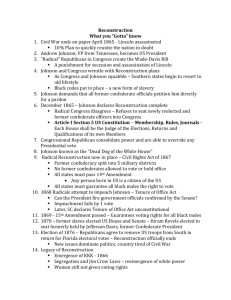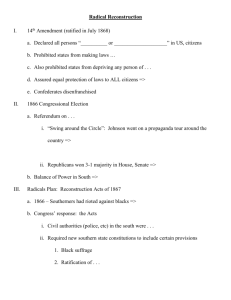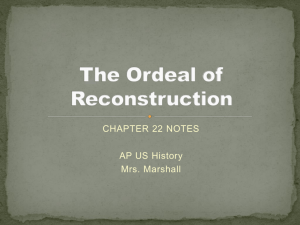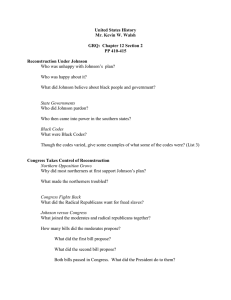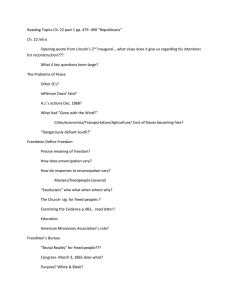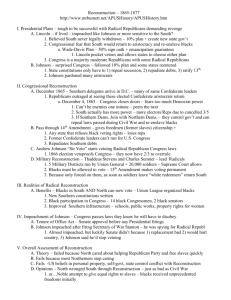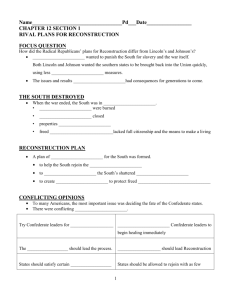Reconstruction I
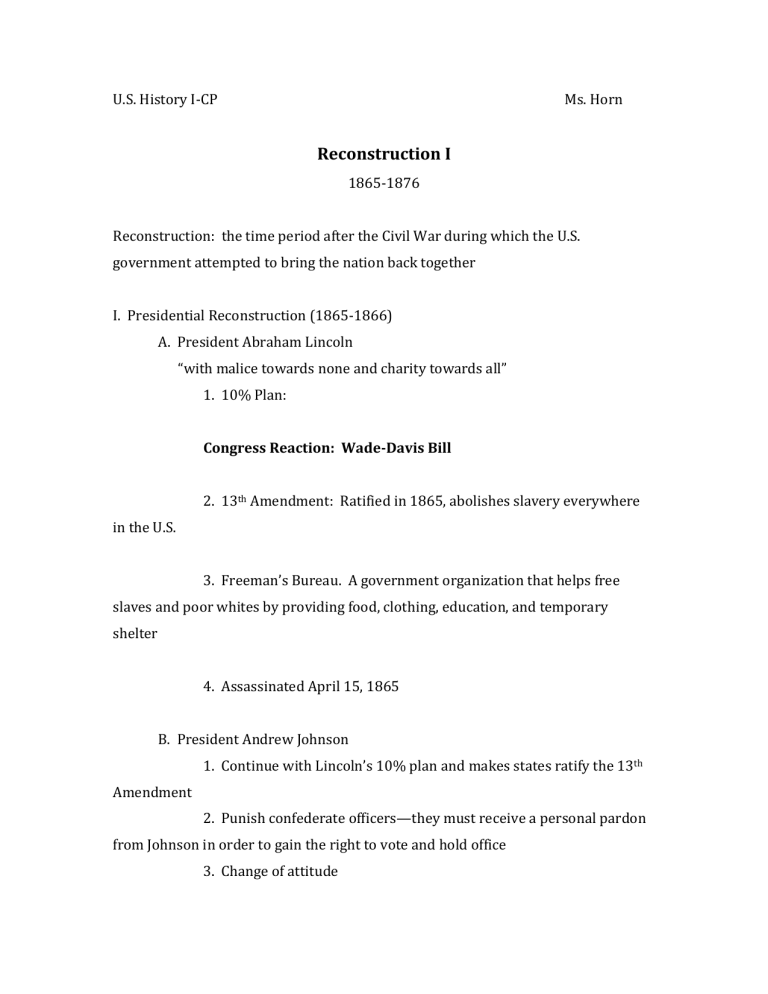
U.S. History I-CP Ms. Horn
Reconstruction I
1865-1876
Reconstruction: the time period after the Civil War during which the U.S. government attempted to bring the nation back together
I. Presidential Reconstruction (1865-1866)
A. President Abraham Lincoln
“with malice towards none and charity towards all”
1. 10% Plan: in the U.S.
Congress Reaction: Wade-Davis Bill
2. 13 th Amendment: Ratified in 1865, abolishes slavery everywhere
3. Freeman’s Bureau. A government organization that helps free slaves and poor whites by providing food, clothing, education, and temporary shelter
4. Assassinated April 15, 1865
B. President Andrew Johnson
Amendment
1. Continue with Lincoln’s 10% plan and makes states ratify the 13 th
2. Punish confederate officers—they must receive a personal pardon from Johnson in order to gain the right to vote and hold office
3. Change of attitude
4. Vetoes:
1. the Freedman’s Bureau
2. the Civil Rights Bill of 1866: would give blacks rights
C. Southern Actions
1. Many states apply for statehood under the 10% plan. Congress
2. Black Codes: state laws that take away all rights from blacks and basically recreate the conditions of slavery.
Evaluation: What do you think of Lincoln’s plan? Of Johnson’s plan? Of the Black
Codes? If you were an American, what would you want to happen next?
D. Americans react: angry at southern
and
and Johnson’s
, Americans vote strongly Republican in the 1866
Congressional elections. This gives Republicans a 2/3 majority in Congress. They now have the power to all of Johnson’s . They are . The North now shares the belief that the South cannot be trusted to accept emancipation, and must be punished and forced to change.
II. Congressional Reconstruction (1867-1876) (aka: Radical Reconstruction)
Radical Republicans want to punish southerners and make sure that blacks have equal rights. This is a ‘radical’ idea, and they make a lot of changes to the government in order to make sure this happens.
A. The Fourteenth Amendment
B. Reconstruction Act of 1867
1. The former Confederate states are divided into 5 military districts.
2. To be readmitted, they must re-write their Constitutions and ratify the Fourteenth Amendment.
What is your opinion of the Reconstruction Act of 1867?
C. The impeachment of Andrew Johnson
A. Johnson vetoed the Reconstruction Act of 1867, but Congress overrode his veto.
B. The last straw: President Johnson was still in charge of enforcing laws. So, he appointed pro-southern generals to enforce the Reconstruction Act of
1867. They were not going to do anything to protect blacks. Congress was furious.
C. Congress passes The Tenure of Office Act. This made it illegal for the president to without Congress’ consent.
1. Congress knew Johnson wanted to fire his Secretary of War.
2. Johnson did fire him, arguing that: a. The Tenure of Office Act was b. He wasn’t actually firing anyone from his
Cabinet, as the Secretary of War had been
appointed by Lincoln.
D. Johnson is impeached: he is ACCUSED of violating the Tenure of
Office Act.
vote.
E. Johnson is NOT REMOVED. He is found
F. In 1868, Ulysses S. Grant is elected president.
D. The Fifteenth Amendment
E. The Civil Rights Act of 1875
by

